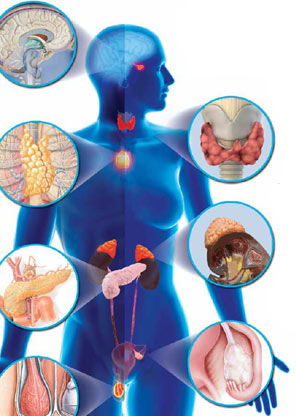 Endocrinology (en·do·cri·nol·o·gy/ endəkrəˈnäləjē/)
Endocrinology (en·do·cri·nol·o·gy/ endəkrəˈnäləjē/)
The study of the biosynthesis, storage, chemistry, and physiological function of hormones and the cells of the endocrine glands and tissues that secrete them.
From the Greek ἔνδον, endo, “within”; κρῑνω, krīnō, “to separate”; and -λογία, -logia, is a branch of biology and medicine dealing with the endocrine system, its diseases, and its specific secretions called hormones, the integration of developmental events such as proliferation, growth, and differentiation (including histogenesis and organogenesis) and the coordination of metabolism, respiration, excretion, movement, reproduction, and sensory perception depend on chemical cues, substances synthesized and secreted by specialized cells.
Endocrine glands include the pancreas (insulin), pituitary, thyroid, parathyroid, adrenal, ovary (women) and testes (men). Other less well known organs include the GI tract, kidney, heart and adipose (fat) tissue.
Please see the menu at left for information about selected endocrine disorders.
(Ref: Modified from Wikipedia)